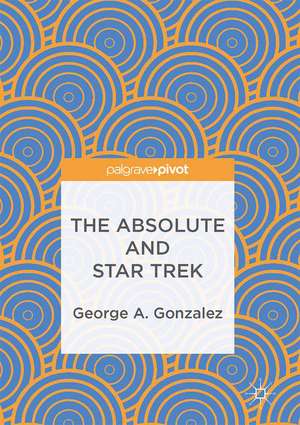The Absolute and Star Trek
Autor George A. Gonzalezen Limba Engleză Hardback – 4 ian 2017
Gonzalez, with wit and wisdom, explains how Star Trek exhibits central elements of the absolute. He describes how themes and ethos central to the show display the concept beautifully. For instance, the show posits that people must possess the correct attitudes in order to bring about an ideal society: a commitment to social justice; an unyielding commitment to the truth; and a similar commitment to scientific, intellectual discovery. These characteristics serve as perfect embodiments of Hegel’s conceptualization, and Gonzalez's analysis is sharp and exacting.
| Toate formatele și edițiile | Preț | Express |
|---|---|---|
| Paperback (1) | 443.97 lei 6-8 săpt. | |
| Springer International Publishing – 13 iul 2018 | 443.97 lei 6-8 săpt. | |
| Hardback (1) | 452.40 lei 6-8 săpt. | |
| Springer International Publishing – 4 ian 2017 | 452.40 lei 6-8 săpt. |
Preț: 452.40 lei
Nou
Puncte Express: 679
Preț estimativ în valută:
86.56€ • 90.62$ • 71.63£
86.56€ • 90.62$ • 71.63£
Carte tipărită la comandă
Livrare economică 07-21 aprilie
Preluare comenzi: 021 569.72.76
Specificații
ISBN-13: 9783319477930
ISBN-10: 3319477935
Pagini: 100
Ilustrații: XIII, 116 p. 5 illus. in color.
Dimensiuni: 148 x 210 x 14 mm
Greutate: 0.37 kg
Ediția:1st ed. 2017
Editura: Springer International Publishing
Colecția Palgrave Macmillan
Locul publicării:Cham, Switzerland
ISBN-10: 3319477935
Pagini: 100
Ilustrații: XIII, 116 p. 5 illus. in color.
Dimensiuni: 148 x 210 x 14 mm
Greutate: 0.37 kg
Ediția:1st ed. 2017
Editura: Springer International Publishing
Colecția Palgrave Macmillan
Locul publicării:Cham, Switzerland
Cuprins
1. Introduction.- 2. Analytic Philosophy and Star Trek.- 3. Speculation in Star Trek.- 4. The Progressive Dialectic of Star Trek.- 5. Star Trek and False Infinities.- 6. Star Trek and Language: Dasein or Speculation?.- 7. Star Trek: Prejudice versus Universal Rationality.- 8. Star Trek: Voyager: Pragmatism and Neo-Pragmatism as False Infinities.- 9. Zombies, Star Trek, and International Relations.- 10. Conclusion: The Inviability of Analytic Philosophy, as well as Bad and False Infinities.
Notă biografică
George A. Gonzalez is Associate Professor of Political Science at the University of Miami, USA. He specializes in the fields of political theory, popular culture, and environmental politics and policy. In the areas of popular culture and political theory he has published two articles in the journal Foundation: The International Review of Science Fiction, as well as the book The Politics of Star Trek: Justice, War, and the Future.
Textul de pe ultima copertă
This volume explains how Star Trek allows viewers to comprehend significant aspects of Georg Hegel’s concept the absolute, the driving force behind history.
Gonzalez, with wit and wisdom, explains how Star Trek exhibits central elements of the absolute. He describes how themes and ethos central to the show display the concept beautifully. For instance, the show posits that people must possess the correct attitudes in order to bring about an ideal society: a commitment to social justice; an unyielding commitment to the truth; and a similar commitment to scientific, intellectual discovery. These characteristics serve as perfect embodiments of Hegel’s conceptualization, and Gonzalez's analysis is sharp and exacting.
George A. Gonzalez is Associate Professor of Political Science at the University of Miami, USA. He specializes in the fields of political theory, popular culture, and environmental politics and policy. In the areas of popular culture and political theory he has published two articles in the journal Foundation: The International Review of Science Fiction, as well as the book The Politics of Star Trek: Justice, War, and the Future.
Gonzalez, with wit and wisdom, explains how Star Trek exhibits central elements of the absolute. He describes how themes and ethos central to the show display the concept beautifully. For instance, the show posits that people must possess the correct attitudes in order to bring about an ideal society: a commitment to social justice; an unyielding commitment to the truth; and a similar commitment to scientific, intellectual discovery. These characteristics serve as perfect embodiments of Hegel’s conceptualization, and Gonzalez's analysis is sharp and exacting.
George A. Gonzalez is Associate Professor of Political Science at the University of Miami, USA. He specializes in the fields of political theory, popular culture, and environmental politics and policy. In the areas of popular culture and political theory he has published two articles in the journal Foundation: The International Review of Science Fiction, as well as the book The Politics of Star Trek: Justice, War, and the Future.
Caracteristici
Offers the novel approach of utilizing the broadcast iterations of the immensely popular Star Trek franchise to analyze/treat/convey continental philosophy Challenges analytic philosophy, including its application to Star Trek Original and innovative contributions to continental and analytical philosophy, as well as international relations, television studies, Marxism, and pragmatism/neo-pragmatism
